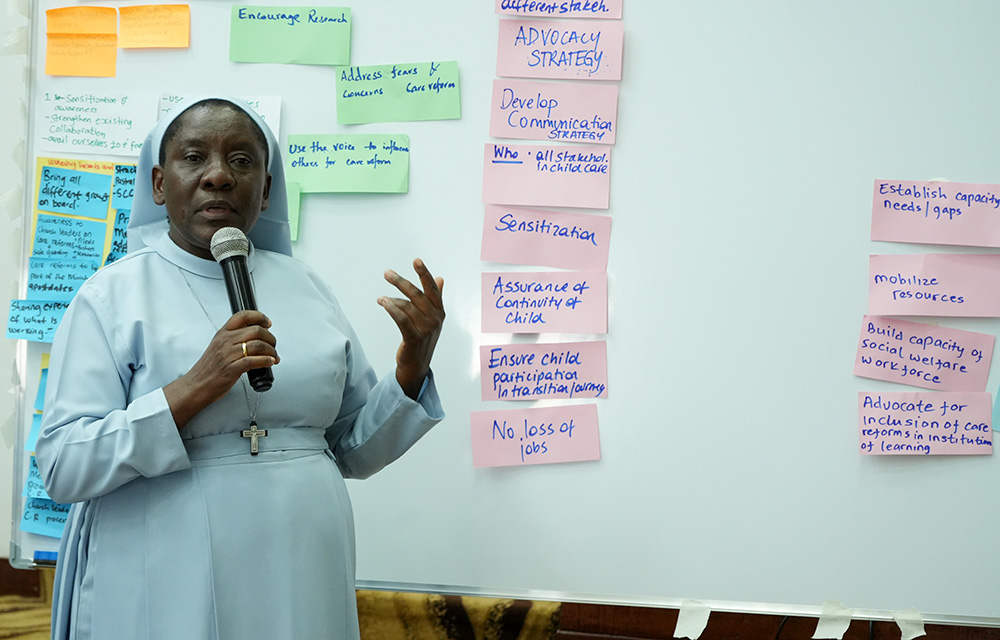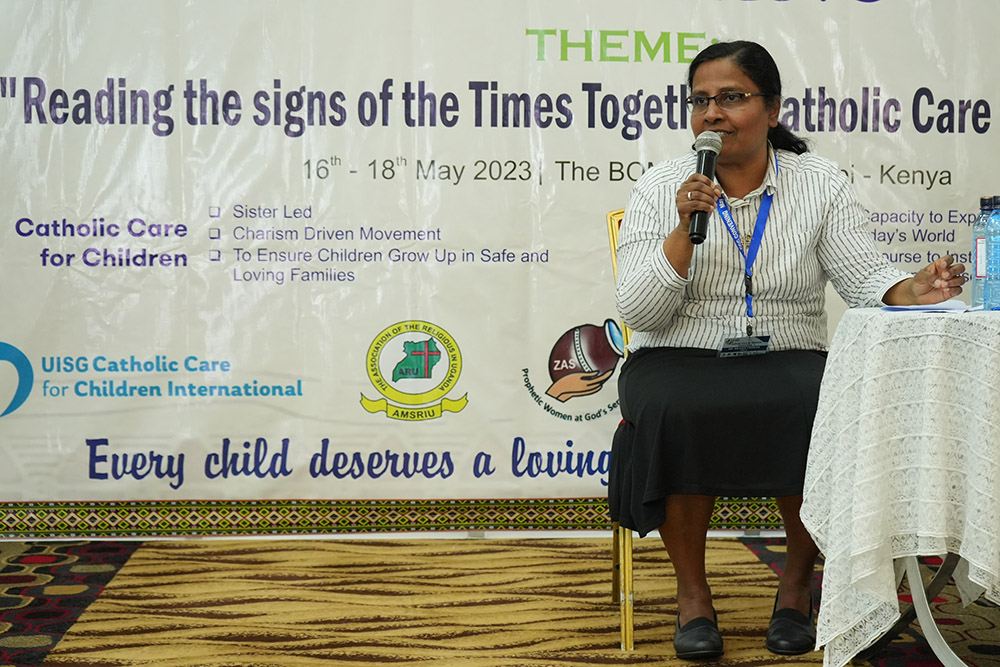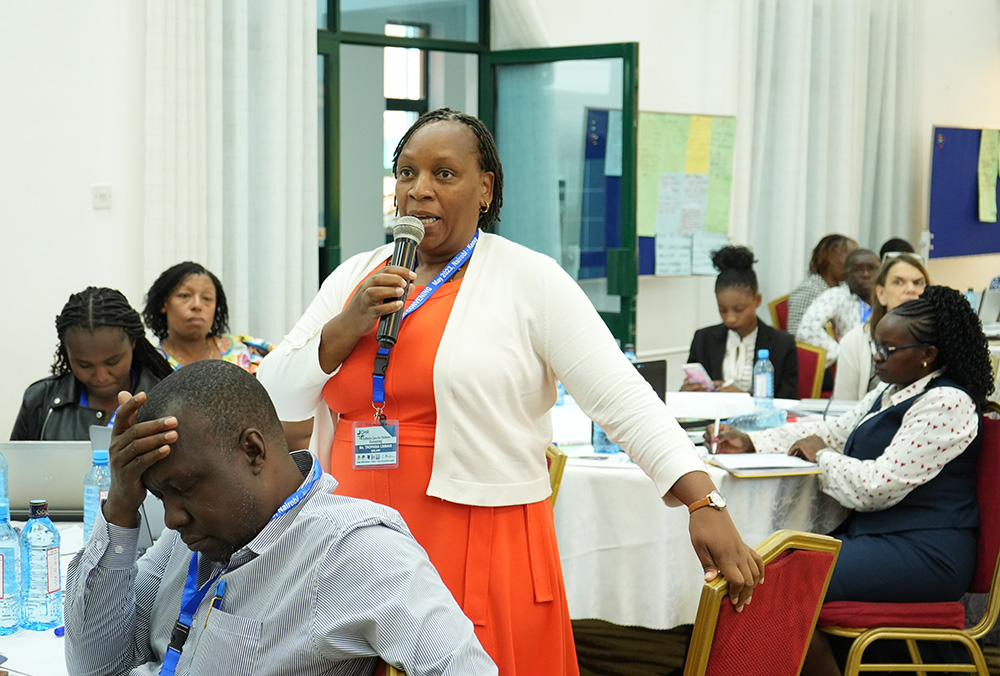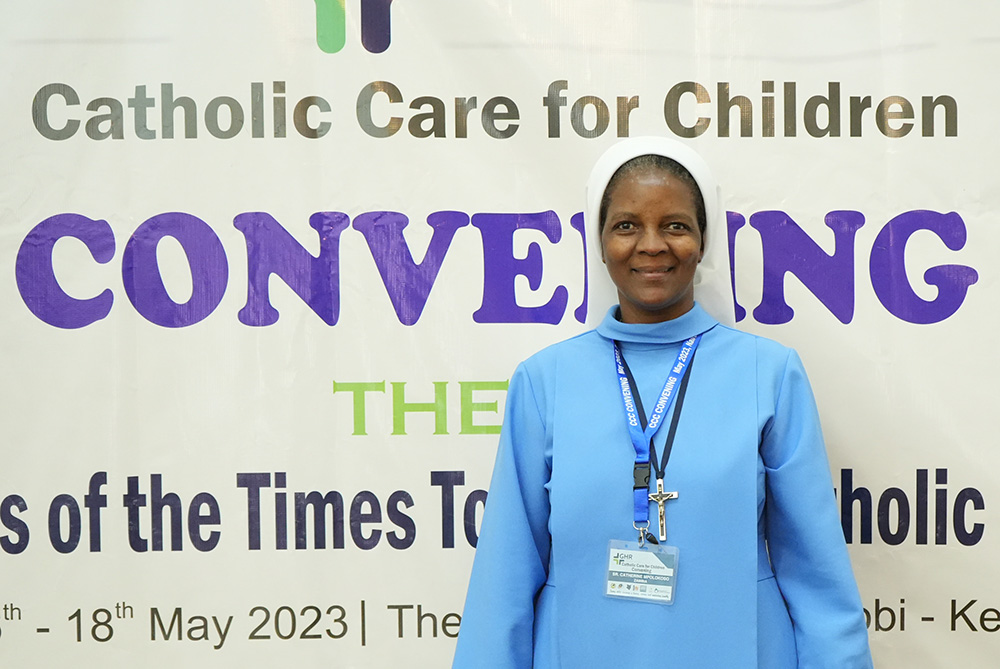
Daughter of St. Therese of the Child Jesus Sr. Euphrasia Masika, director of the Catholic Care for Children Uganda, recounts strategies her team deployed in their pilot from 2016, which is considered a successful case study for other Catholic Care for Children global interventions. (GSR photo/Wycliff Peter Oundo)
Dozens of religious sisters are among the stakeholders who convened in Kenya's capital to emphasize the need for all children globally to grow up in safe, nurturing families rather than in institutional care.
The Catholic Care for Children Convening, which ran May 16-18 in Nairobi, was organized by the International Union of Superiors General (UISG), Catholic Care for Children International (CCCI) and GHR Foundation. More than 100 participants from different religious bodies from African countries, the United States and Italy gathered to exchange ideas on creating new models for caring for vulnerable children with the theme "Reading the Signs of the Times Together."
The convening comes barely two years after the launch of the Catholic Care for Children International initiative under the auspices of UISG — one of many faith groups leading policy reform and family-based alternatives to institutional care.
Catholic Care for Children International's mission is to support institutes of consecrated life ministering on child care to read the signs of the times, reduce the need for care in institutions, prevent family separation, and provide alternatives to enable children to grow up in a safe and loving family environment.

Sr. Niluka Perera, a member of the Congregation of Our Lady of Charity of the Good Shepherd and the coordinator of Catholic Child Care International, presents to attendees at the convening in Nairobi, Kenya. (GSR photo/Wycliff Peter Oundo)
Religious sisters in four African nations — Uganda, Malawi, Zambia and Kenya — have been at the forefront of this effort.
Sr. Niluka Perera, the coordinator of Catholic Care for Children International, said the gathering has brought together episcopal leaders, government representatives, Catholic sisters, advocacy groups and policymakers from East Africa to "reflect upon and discern the Catholic Church's growing commitment to ensure all children are safe."
"We have converged here as stakeholders because we realized that the work of taking care of children is the responsibility of everyone," Perera told Global Sisters Report in an interview at Boma Hotel in Nairobi. "All the children belong to God. Therefore, everyone from parents, relatives, society, the church and the government is responsible for caring for them. Once children are born, they become our responsibility to bring them up in a loving environment."
Perera, a member of the Congregation of Our Lady of Charity of the Good Shepherd, applauded the efforts by the sisters from the East African region for the past few years since the Catholic Care for Children initiative launched in the region and urged other stakeholders to join the sisters and ensure every child grows up in a nurturing family environment.

Trophina Limbani, a social welfare officer in Malawi, responds to questions from the audience on legal and national frameworks that govern child care institutions and children's reintegration policies in Malawi. Limbani was among government representatives who attended the Catholic Child Care convening in Nairobi, Kenya. (GSR photo/Wycliff Peter Oundo)
A Sri Lankan nun who is also a social worker, Perera said the initiative had decided to change the strategy and involve other stakeholders, including government representatives, civil society organizations, the community and parents, to ensure more children are placed in families instead of institutions.
"CCCI realized that the sisters were working alone and decided to bring other stakeholders so that sisters could share with them their ideas, experiences and challenges of bringing up children in a safe environment," said Perera, who was appointed by Pope Francis to the Pontifical Commission for the Protection of Minors in September 2022. "We also wanted to bring together sisters from various congregations and countries under one roof to exchange ideas and improve their pursuit of bringing up children in a loving environment."
Kathleen Mahoney, a program officer of GHR Foundation, applauded the sisters from the four African countries for reintegrating nearly 4,000 children since 2019 from more than 70 charitable institutions.
GHR provides funding in the four African countries for the training of sisters in social work, case management and child care programs and assisting in the transition from institutional to family care. (GHR Foundation and the Conrad N. Hilton Foundation also fund Global Sisters Report.)
"The sisters have shown that it is possible to transition from institutional care to family and community-based care," Mahoney told GSR. "This convening is meant to bring more people into the conversation on how we can work together to continue the momentum to help all the children grow up in safe and nurturing families."
Archbishop Martin Kivuva of Mombasa, Kenya, who attended the convening, encouraged the participants to adopt the Catholic Care for Children project to ensure vulnerable children don't land in the hands of exploitative individuals and institutions.
In reference to the recent cult deaths in Kenya, Kivuva urged religious sisters and other stakeholders, especially in Africa, to seriously embrace the Catholic Care for Children initiative to ensure fake pastors or irresponsible parents and families do not harm children.
Advertisement
At the heart of the recent mass deaths is Paul Mackenzie, a controversial preacher at Good News International Church who is accused of having brainwashed his followers, leading them to starve to death to meet Jesus Christ. Police have exhumed more than 220 bodies from the 800-acre Shakahola forest in southeastern Kenya, where Mackenzie's followers are believed to have been buried. The police said the children were targeted as the first to be starved to death.
"Children are the building blocks for our society, and the family is the life sanctuary," said Kivuva, who is also the chairman of the Kenya Conference of Catholic Bishops. "This is why the church needs to assign more responsibility to nurture and protect our children."
He added, "The recent cultic murders of hundreds of innocent children are a wake-up call for the church to adopt child care reforms."
Meanwhile, sisters attending the convening noted that the ongoing discussion about care reforms was important to help them shift the care of children from institutions like orphanages to a family.

Sr. Catherine Mpolokoso, a member of the Little Servants of the Mary Immaculate, represented the Catholic Care for Children Zambia at the convening in Nairobi, Kenya. (GSR photo/Wycliff Peter Oundo)
Sr. Catherine Mpolokoso of the Congregation of Little Servants of Mary Immaculate said she would implement what she had learned from the convening to ensure she increases the number of children moving from child care institutions to families or family-like environments.
"This convening is going to help us and the other people we are working with, like bishops, priests and the government, to shift our mode of caring into family," said Mpolokoso, the coordinator of the Catholic Care for Children projects in Zambia. "I now plan to implement the care reforms I have learned here by turning away from institutional care to family-based care."
"This gathering is a good opportunity for us to work together for the betterment of the society," she added. "We are calling for collaboration from all the members of the community. We want to work together and make a difference."





